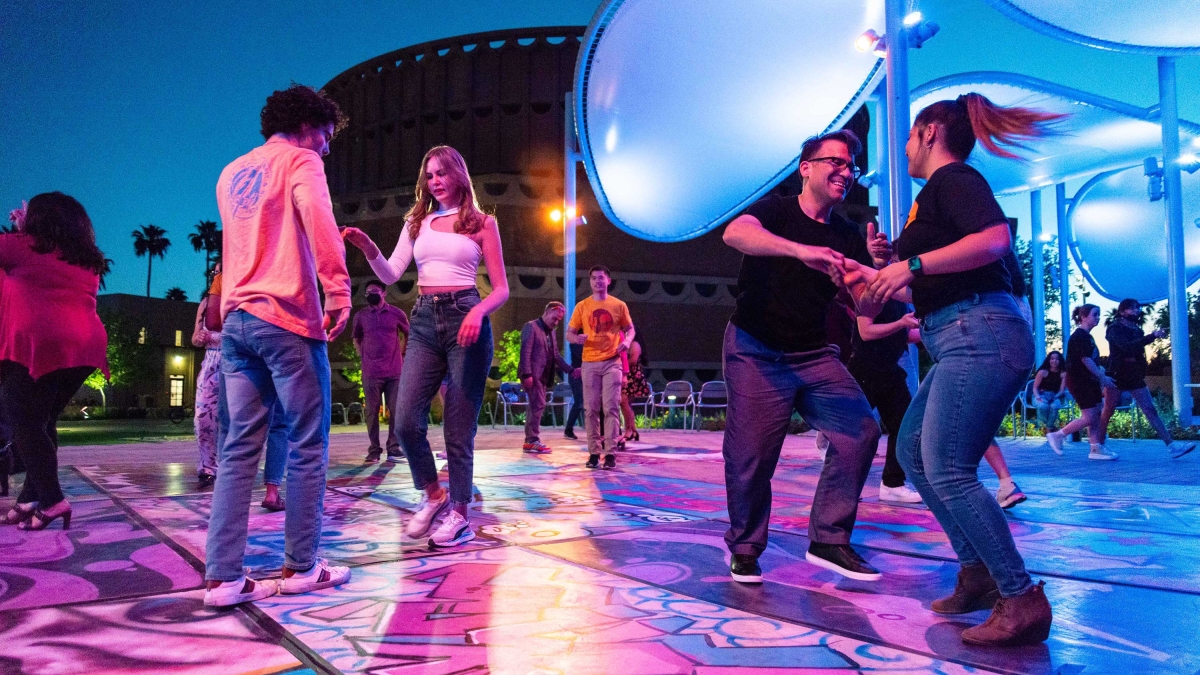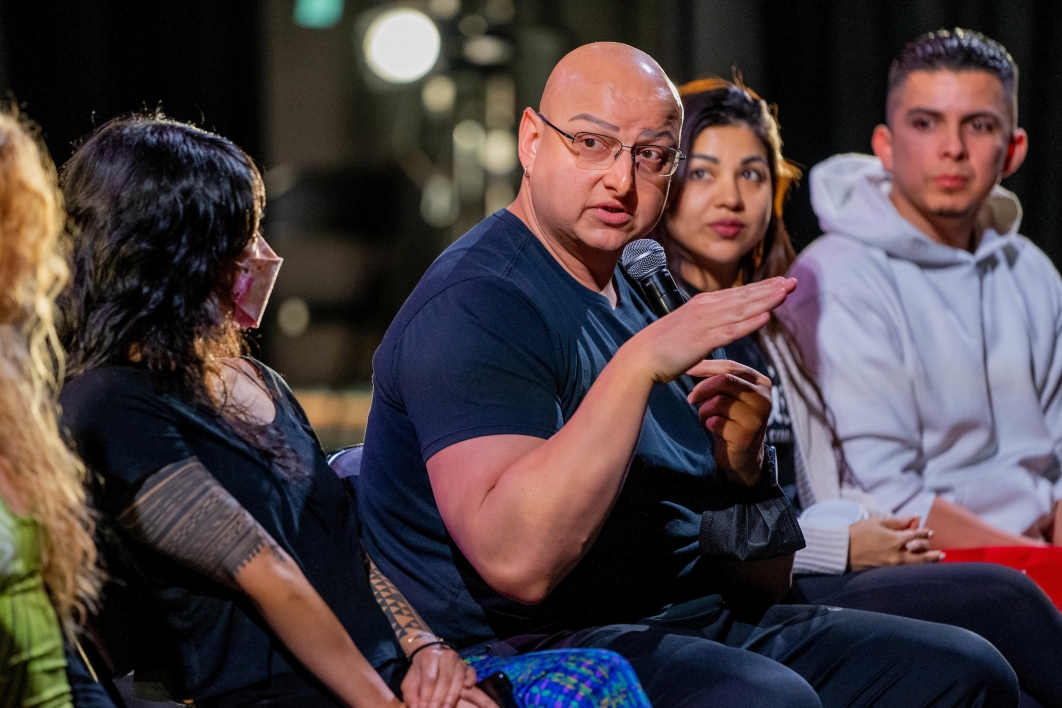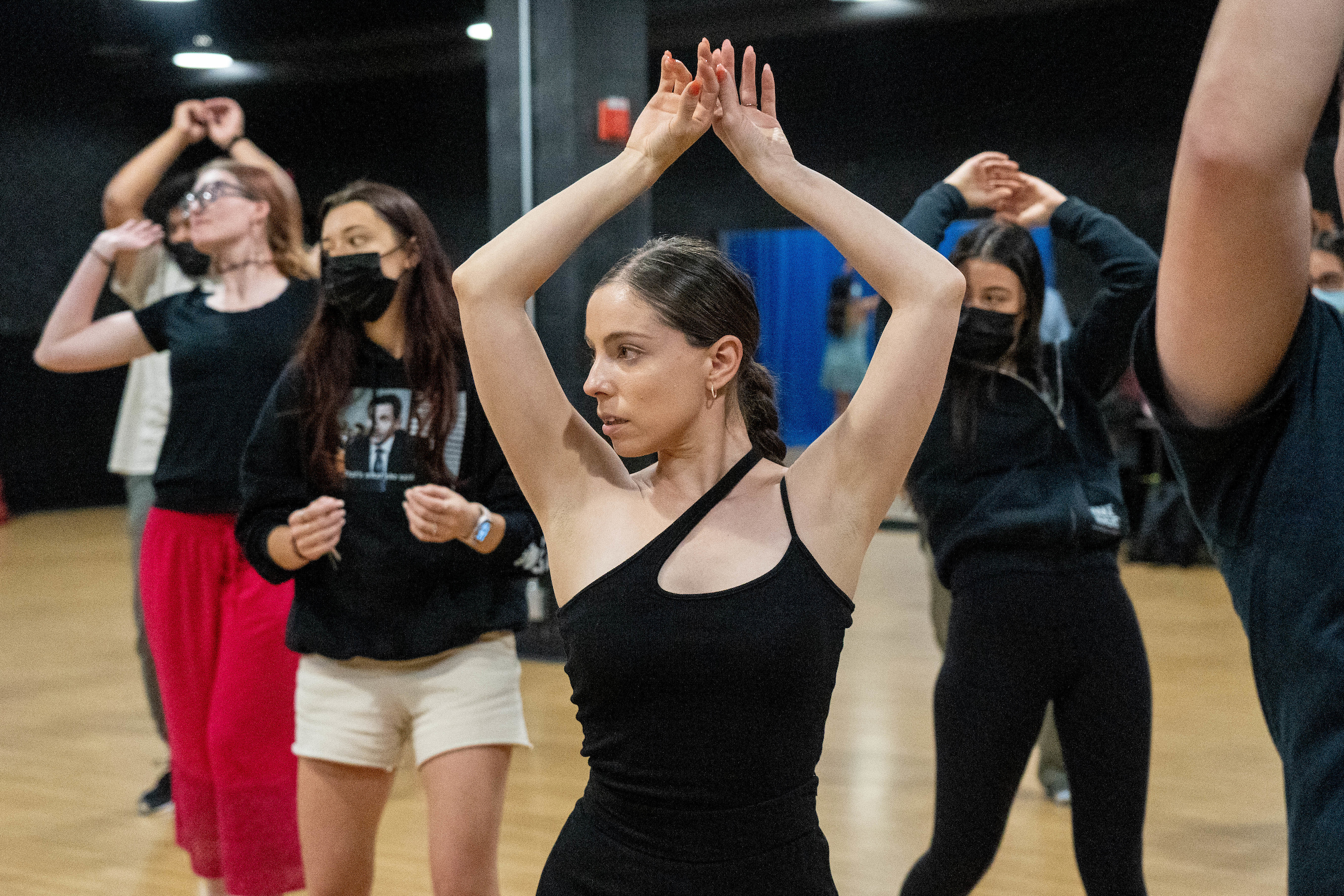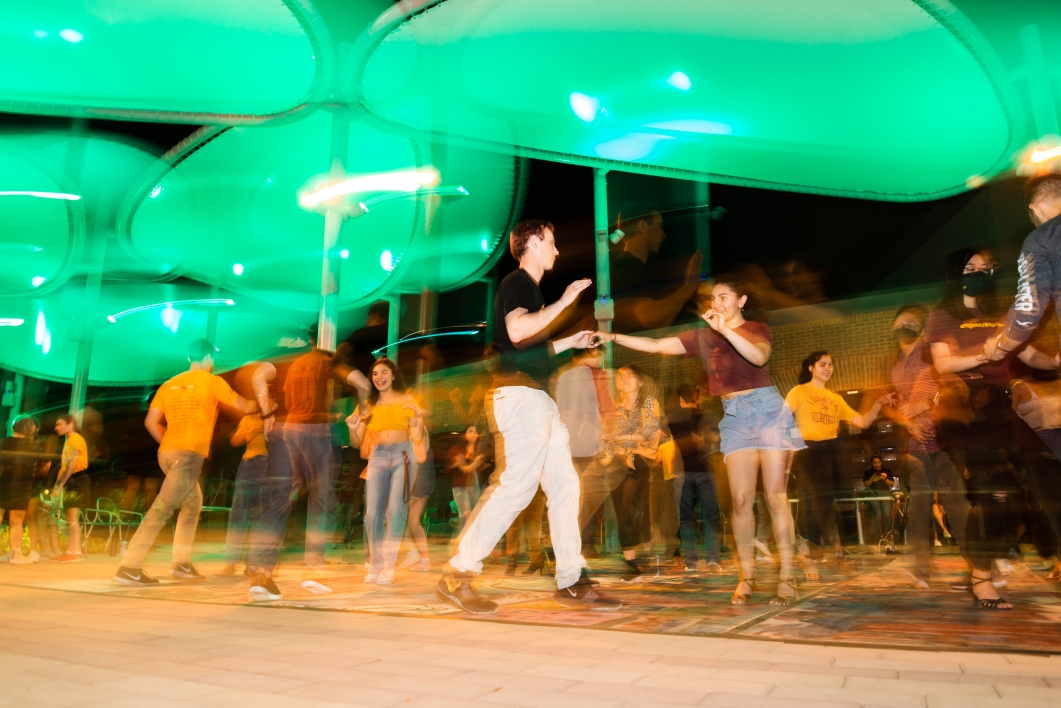Several of the country’s top salsa dance instructors told students at Arizona State University how they found solace and passion in the dance community when they were accepted nowhere else.
Mario Gonzalez, an instructor and performer who goes by “Mario B,” was ostracized as a child when he lost all his hair at age 7 due to the condition alopecia.
“We’re talking about 1983 – no Google, no internet, no resources. Just a sick kid and nobody knows what’s happening so they stay away,” he said.
Gonzalez addressed a group of students on Friday at the first session of the Latin Sol Festival, a three-day event of Latin dance workshops, talks and social dances held at ASU, April 1–3. He was among several dance instructors who spoke at the “Dance Matters” panel discussion.
Salsa performer and Instructor Mario Gonzalez, who goes by "Mario B," told students how he found acceptance in the dance community after a childhood marked by isolation. He spoke at the "Dance Matters" panel discussion during the Latin Sol Festival at ASU on April 1. Photo by Samantha Chow/ASU News
“It was very difficult, but there was something special about the dance community when I joined,” said Gonzalez, who is based in New Jersey.
“We live in a stereotypical society where when you picture a dancer, this is not what you see. We think of athleticism. I look like the guy who will come in a fix your plumbing.
“I enjoy what I do today because I create a platform for other people like myself who were not accepted into a community. I get emails saying, ‘I’m so happy to see a big guy dancing.’“
Ahtoy WonPat-Borja, who goes by the performer name "Ahtoy Juliana," grew up in Guam, where she is a member of the Indigenous population. Her first exposure to dance was at age 10, when she saw a ballet dancer.
“My journey is about my individual identity and trying to find my way through a dance world that is very much Western,” she said.
She later trained with the Houston Ballet, and then moved to New York, where she attended Columbia University.
“I found Latinos when I was at Columbia, and I was overjoyed that I could live in a dance world that was for brown people,” said Juliana, the co-founder of BAILA Society salsa company in New York.
Several of the Latin Sol Festival sessions were dedicated to Latin hustle, a dance form that originated among Puerto Ricans in the Bronx in the late 1960s and early 1970s, according to Juliana. Many times, the dancers were men who danced by themselves or with each other.
“They danced ‘the grind’ and it was very scandalous,” she said.
Juliana and her dance partner, Edwin Tolentino, led an “Intro to Latin Hustle” session on Friday night.
Natasha Tia, a dance instructor from San Diego who launched an online platform, told the students that her family dealt with addiction issues and mental illness, and dance is a way for her to find balance in her life. She compared it to a meditation practice.
“Dance is so personal and expressive,” she said.
Carla Leon, a PhD student in Spanish literature, participates in a "Mambo Body Technique" class taught by Natasha Tia as part of the three-day Latin Sol Festival in Tempe on April 1. Photo by Samantha Chow/ASU News
“It’s a way to carve out time for yourself so that you can show up with a clear mind, clear heart and clear voice.”
Several of the instructors said that attending social dances – open to anyone – at studios is a good way to build a dance community. At a social dance, anyone can dance with anyone else.
The instructors talked about same-sex partnering, and Tolentino said that there are still some people who are not OK with it.
“Everyone changes at their own time. You have to see it enough to see it normalized,” he said.
“It’s starting to become more normal as the dancers see the instructors do it. I try to dance with everybody I can.”
Juliana said she addresses it explicitly when teaching.
“From a salsa perspective, it is based on gender norms and it is modeled after ‘machista’ attitudes. I have an opportunity to talk to newcomers, and a lot of times they are not Latino. I tell them, ‘This is how you conduct yourself. This is what you say. You need to read your partner,'“ she said.
“I don’t use the words 'man' and 'woman,' I use the terms 'lead' and 'follow.' I’m super excited to start exploring this in Latin hustle, because Latin hustle has a culture of same-sex partnering.”
Dancers participate in a social dance on Friday, April 1, as part of the three-day Latin Sol Fesitval on the ASU Tempe campus. Photo by Camille Bruya
David Olarte, a clinical assistant professor in the School of Music, Dance and Theatre and a salsa performer and instructor, moderated the panel discussion.
“Salsa is highly complex and highly process-oriented, with many different histories that are represented when we dance salsa,” he said.
“The Latin Sol Festival embodies the energy and spirit of the students and where they are.
“When our community spends time here through our workshops and social dances, it gives them the opportunity to learn from you and for you to learn from the community.”
The Latin Sol Festival, which started in 2017, is sponsored by the School of Music, Dance and Theatre and all of the organization is done by students in the ASU Salsa Club, led by senior Xochilt Huitzil.
Top photo: Dancers participate in a social dance on Friday, April 1, as part of the three-day Latin Sol Festival on the ASU Tempe campus. Photo by Camille Bruya
More Arts, humanities and education

Grand Canyon National Park superintendent visits ASU, shares about efforts to welcome Indigenous voices back into the park
There are 11 tribes who have historic connections to the land and resources in the Grand Canyon National Park. Sadly, when the park was created, many were forced from those lands, sometimes at…
ASU film professor part of 'Cyberpunk' exhibit at Academy Museum in LA
Arizona State University filmmaker Alex Rivera sees cyberpunk as a perfect vehicle to represent the Latino experience.Cyberpunk is a subgenre of science fiction that explores the intersection of…

Honoring innovative practices, impact in the field of American Indian studies
American Indian Studies at Arizona State University will host a panel event to celebrate the release of “From the Skin,” a collection over three years in the making centering stories, theories and…



